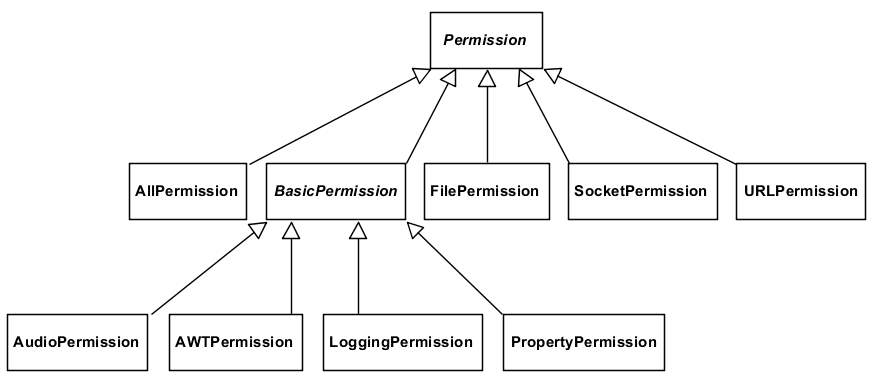|
Java Security - Specification
An Introduction to the Internals |
|
Prof. David Bernstein |
| Computer Science Department |
| bernstdh@jmu.edu |
|
Java Security - Specification
An Introduction to the Internals |
|
Prof. David Bernstein |
| Computer Science Department |
| bernstdh@jmu.edu |
SecurityManager and
AccessController
Permission is just allowed or disallowed)abstract boolean implies(Permission other)
returns true
if this
Permission
implies other (i.e., if other
is a subset of this)Permission objects represent positive permissions
(i.e., approvals) so the absence of a particular permission
is implicitly a denialPermission objects are immutable
Permission dataread, exit;
// An example with an action
dataread = new FilePermission("/data/census", "read");
// An example without an action
exit = new RuntimePermission("exitVM");
Permission Classpublic abstract String getActions():
String representation of the
actions (usually comma-delimited)public abstract boolean implies(Permission other):
true if this
object's actions imply the other object's
actions (i.e., if other is a subset of
this)PermissionCollection is not parameterized
but the formal parameter of the add() method is a
Permission
newPermissionCollection()
in the Permission class to construct the
PermissionCollection
Permission can't be
denied by anotherimplies() method in
the PermissionCollection class can
use short-circuitingCodeSource Classpublic CodeSource(URL url, Certificate[] certs)
public boolean implies(CodeSource other):
true if other is a
subset of this
(e.g., http://cs.jmu.edu/ is a subset
of http://jmu.edu/) and all
of other's certificates are included
in this'sPrincipal InterfaceProtectionDomain objects are normally created
by a ClassLoader
ProtectionDomain is only created the first time
a CodeSource is encountered (so all classes
with the same CodeSource are mapped to the same
ProtectionDomain)null class loader)CodeSource and ClassLoader)
not individual objectsPermission objects may be bound to
a ProtectionDomain at load-time (e.g., by the
ClassLoader)Permission objects may not be bound to a
ProtectionDomain until
the ProtectionDomain is used for a security
check (e.g., by the Policy)